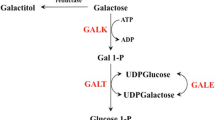Abstract.
During the last decades, better understanding of specific enzymatic deficiencies has led to improved dietary management of children suffering from glycogen storage disease (GSD). Normal growth and development of infants can be achieved by a diet of regular meals supplemented by glucose and cornstarch during the night, and by monitoring glucose blood levels. This has resulted in an increase in the number of patients reaching adulthood and reproduction age. Therefore, developing a strategy for an optimal management of contraception and pregnancy is crucial for young women affected by GSD. Contraception has to be adapted to the specific metabolic requirements of women with GSD. Hormonal contraception is classically based on the combination of various synthetic progestogens and ethinyloestradiol. Ethinyloestradiol should be avoided because of a link with hepatic adenomas and is contraindicated in patients with hypertriglyceridaemia and hypercholesterolaemia. Blockade of ovulation can be achieved using high doses of progestogen alone, administered from the 5th to the 25th day of the cycle. Another scheme of hormonal contraception is based on daily administration of low doses of progestogen, which usually acts on local parameters of fertility, and can also achieve blockade of ovulation for the most recent compound proposed. Mechanical contraception using intra-uterine device is controversial for nulliparous patients. Benefits and side-effects of these different proposals are discussed. During pregnancy, the maternal nutritional state is important and a healthy maternal response to feeding and fasting is modified to ensure a constant supply of glucose for the developing fetus. Women with GSD are at risk of frequent hypoglycaemia. Only a few cases of successful pregnancies have been reported for patients with GSD. The outcomes using different approaches of dietary and obstetric management are discussed. Conclusion: in the future, multidisciplinary management is necessary to improve obstetric outcome of pregnancy in females affected with glycogen storage disease.
Similar content being viewed by others
Author information
Authors and Affiliations
Additional information
Electronic Publication
Rights and permissions
About this article
Cite this article
Mairovitz, V., Labrune, P., Fernandez, H. et al. Contraception and pregnancy in women affected by glycogen storage diseases. Eur J Pediatr 161 (Suppl 1), S97–S101 (2002). https://doi.org/10.1007/s00431-002-1013-x
Issue Date:
DOI: https://doi.org/10.1007/s00431-002-1013-x




